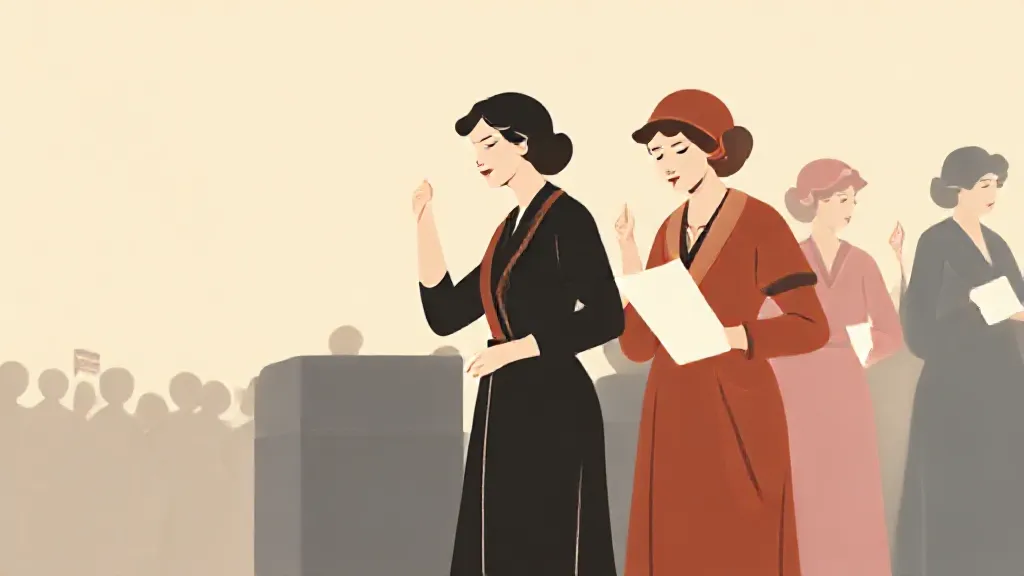The ratification of the 19th Amendment in 1920 marked a pivotal moment in American history, granting women the legal right to vote and fundamentally altering the landscape of gender equality. This monumental change not only empowered women politically but also catalyzed broader social and economic transformations that would shape their lives for generations to come. Understanding how the 19th Amendment changed women's lives requires a deep dive into its historical context, the struggles that led to its passage, and the lasting effects it has had on society.
The Historical Context of Women's Suffrage
The journey toward the 19th Amendment began long before its ratification, with early advocates like Elizabeth Cady Stanton and Susan B. Anthony leading the charge in the mid-19th century. The Seneca Falls Convention of 1848 is often cited as the birthplace of the women's suffrage movement in the United States, where the Declaration of Sentiments was presented, outlining the grievances and demands of women.
As the movement gained momentum, women organized marches, rallies, and campaigns, facing significant opposition and societal backlash. The suffragists utilized various strategies, including peaceful protests and civil disobedience, to draw attention to their cause, culminating in the eventual passage of the 19th Amendment.
Political Empowerment and Representation
The most immediate impact of the 19th Amendment was the enfranchisement of women, allowing them to participate in the democratic process.
This newfound political power enabled women to influence legislation and advocate for issues that mattered to them, such as education, healthcare, and labor rights. Women began to run for office, and their participation in politics gradually increased. Figures like Jeannette Rankin, the first woman elected to Congress, exemplified this shift.
The ability to vote not only empowered women individually but also fostered a sense of community and solidarity among them, as they rallied around shared goals and aspirations.
Social Changes and Gender Roles
The ratification of the 19th Amendment also contributed to a reevaluation of traditional gender roles. As women gained the right to vote, societal expectations began to shift.
The idea that women should be confined to domestic spheres started to wane, leading to greater participation in public life. This transformation was not instantaneous, and many women still faced discrimination and inequality, but the amendment served as a catalyst for future movements advocating for women's rights, including the fight for equal pay and reproductive rights.
Economic Impact and Workforce Participation
The 19th Amendment coincided with significant changes in the American workforce.
World War I had already propelled many women into jobs traditionally held by men, and the post-war period saw a continued push for women's economic independence. With the right to vote, women were more likely to advocate for labor rights and fair wages, leading to the establishment of organizations aimed at protecting women's interests in the workplace. This economic empowerment laid the groundwork for future generations of women who would continue to break barriers in various fields, from business to science.
Cultural Shifts and Representation in Media
As women began to assert their rights and identities, cultural representations of women also evolved. The 1920s, often referred to as the "Roaring Twenties," saw the emergence of the flapper, a symbol of women's newfound freedom and independence. Literature, film, and art began to reflect women's experiences and challenges, fostering a greater understanding of women's roles in society.
This cultural shift not only influenced public perception but also inspired future generations of women to continue advocating for their rights.
The Ongoing Struggle for Equality
While the 19th Amendment was a significant achievement, it is essential to note that it did not guarantee equality for all women. Women of color, particularly African American, Native American, Asian American, and Latina women, faced additional barriers to voting and participation in the political process.
The Voting Rights Act of 1965 and other subsequent legislation aimed to address these disparities, highlighting that the fight for equality was far from over. The legacy of the 19th Amendment serves as a reminder of the ongoing struggle for comprehensive civil rights.
Legacy and Future Implications
The impact of the 19th Amendment continues to resonate today.
Women remain active in politics, with increasing representation in leadership roles at local, state, and national levels. The amendment set a precedent for future movements advocating for gender equality, including the feminist movements of the 1960s and 70s and contemporary movements addressing issues like sexual harassment and reproductive rights. Understanding the 19th Amendment's legacy is crucial for recognizing the progress made and the work that still lies ahead in achieving true equality.
Conclusion: A Milestone in Women's Rights
In conclusion, the 19th Amendment was a watershed moment in American history that fundamentally changed women's lives. It empowered women politically, socially, and economically, challenging traditional norms and paving the way for future advancements in women's rights. While significant progress has been made, the journey toward complete equality continues.
The 19th Amendment serves as a powerful reminder of the importance of civic engagement and the ongoing fight for justice and representation for all women.
